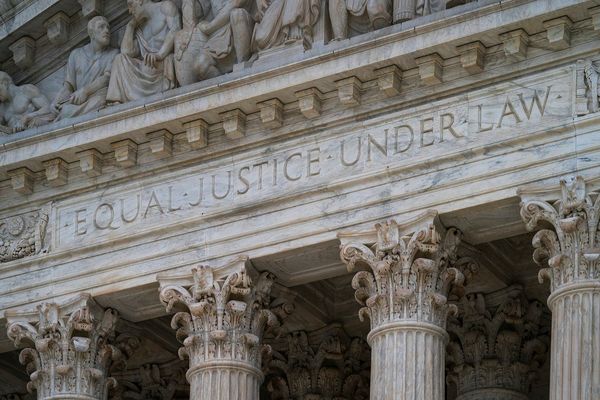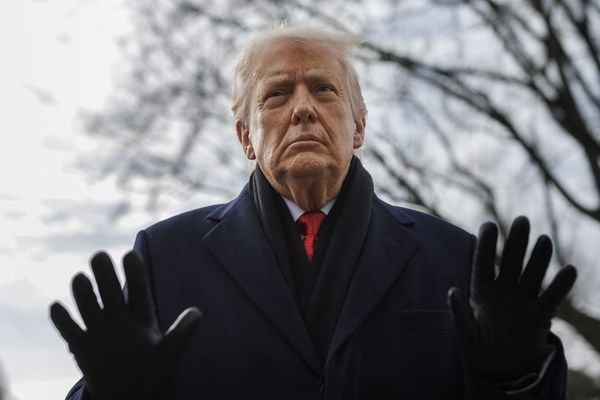Singaporean energy experts have poured cold water on plans backed by billionaires Andrew Forrest and Mike Cannon-Brookes to export solar power to the island nation, saying they are likely to be too expensive and impractical.
Australian company Sun Cable wants to develop the world's biggest green-energy export project by building a giant 20-gigawatt solar farm in the Northern Territory before sending the power to Singapore via a 4,200-kilometre-long subsea cable.
The farm, which would cover 12,000 hectares — equivalent to 12,000 rugby pitches — would be backed by the world's biggest battery network.
In total, the venture would be expected to cost more than $30 billion.
Mr Forrest and Mr Cannon-Brookes were leading investors in the recent $210 million capital raising offer, with both men vocal advocates for Australia's potential to be a world leader in green energy production.
But while Sun Cable has billed its Asia Power Link proposal as a trailblazer for renewable energy exports, Singaporean energy market observers have questioned whether the project will ever get up.
William Stroll, a Singapore-based lawyer specialising in energy, said the vision outlined by Sun Cable was "commendable" but likely to be prohibitively expensive.
"It's a fantastic, visionary idea," Mr Stroll said.
"I love the aggressiveness of it and the foresight.
"But at the same time, it needs to fit into the target countries' demands and requirements."
Singapore's neighbours 'cheaper'
Under plans announced by its government, Singapore has flagged importing up to 4GW of green energy by 2035 as part of efforts to reduce its reliance on gas-fired power and become carbon neutral within three decades.
Unravel Carbon co-founder Marc Allen, who until earlier this year lived in Singapore for five years, said energy security was driving the government's decisions.
Singapore's power system relies almost totally on imported gas, including shipped liquefied supplies, which have rocketed in price in the past year.
Despite this, Mr Allen said Singapore was not desperate for the power, noting its electricity system was almost twice as big as it needed to ensure it almost never ran short of supplies.
As a consequence, he said, the trading hub was under little pressure to make a quick decision about where it sourced its renewable power from.
In any case, Singapore was much more likely to partner with one of its South East Asian neighbours such as Thailand or Indonesia given their proximity, he said.
Malaysia has banned renewable energy exports.
"Singapore doesn't need the energy … at the moment," Mr Allen said.
"And the conversations within [Association of South East Asian Nations] countries appear to be a little bit more developed at the moment."
Sun Cable business case queried
To illustrate the point, Mr Allen noted Sun Cable was facing competition from projects that were much closer to Singapore, such as a 3.5GW solar farm earmarked for the Riau Islands in Indonesia, 270km away.
He said there were also plans to further develop a regional power grid that could allow Singapore to import renewable energy sources, such as hydro-electricity from Laos.
Mr Allen said it seemed Sun Cable would need to find buyers in Singapore willing to shell out a premium for its green power, but he doubted there would be many takers.
"I think it will be challenging to build up a solid business case," he said.
"How much of that return comes from subsidies from one or either government? How much comes from charging more for the electrons?
"I can't answer that."
Sun Cable chief executive David Griffin was confident the project could go ahead, saying it was important not to underestimate the amount of electricity that would be needed to meet Singapore's growing demands.
Mr Griffin noted that demand was set to rise sharply in coming years as Singapore moved to power big chunks of its economy with electricity rather than fossil fuels.
At the same time, he said, Singapore was poised to shut a "material" amount of its gas-fired power capacity as long-term contracts for cheap supplies from Malaysia and Indonesia expired.
Australian solar 'better' than others
Once that happened, Mr Griffin said, the island country would be far more exposed to shipped liquefied natural gas, which was invariably more expensive and volatile in pricing.
"It [Singapore] is a great market, very strong demand and growing demand and a regulator that wants to see interconnectors as part of the supply to Singapore," he said.
"That will diversify their supply and give them more resilience against shocks on being overly reliant on LNG."
Mr Griffin acknowledged Singapore had closer neighbours than Australia but argued it was cheaper and easier to develop solar farms "at scale" in the Northern Territory.
He said it was likely Singapore would end up sourcing renewable energy from a number of different countries and Australia — through Sun Cable — was well placed to be among them.
"You cannot secure long-term electricity contracts in Singapore at the moment because it is 97 per cent based on gas and gas is an extremely volatile-priced commodity," he said.
"That is a major advantage — that enables our customers to plan for the long-term and it's the first time they've even been able to do it."
Others backed Mr Griffin's views.
David Leitch, a leading renewable energy expert and former analyst at investment bank UBS, said although it was ambitious in its scope, the Asia Power Link was "plausible".
Mr Leitch, who now runs forecasting provider ITK Services, said even though Singapore had closer neighbours than Australia, none had solar resources that were as good.
Grand vision project 'plausible'
"Generally speaking, access to solar energy in South East Asia doesn't seem to be as good as in countries like Australia," Mr Leitch said.
"And that is mainly because the land is expensive due to population density.
"You have to devote land resources to it.
"There probably is a lot of land but it's just being used for higher-value purposes."
For Mr Leitch, the biggest hurdle facing Sun Cable was the technical feasibility of running the world's biggest power cable from Darwin through Indonesian waters to Singapore.
But he said that if the company was able to overcome those concerns, it could well convince buyers in Singapore to take the risk because Australia was seen as "the sort of partner they would like to do business with".
"But in a way it only requires scaling up existing technologies.
"The three things you need are the quality of the consortium, the quality of the customer and the certainty or the confidence around the technology and the cost estimates.
"I think this project has the makings of all three.
"And the economics — if you were happy about the cable viability, the technical risks — are probably better than hydrogen economics in my opinion for export."
Scepticism as cost doubt remains
Mr Stroll said it was possible Sun Cable could crack the Singapore market if the company found a customer willing to sign on to a long-term, take-or-pay contract to underpin the investment.
However, he said the project "certainly hasn't permeated public consciousness to a great degree yet" and he remained sceptical.
"It's tough to see how they will compete in terms of pricing, to put it frankly," Mr Stroll said.
"The way this auction will be run in Singapore is not very clear, but price will be a key consideration in terms of who the Singapore authority decides to go with in the end.
"Unless they have something up their sleeve … it's tough to see how they could justify [it]."







